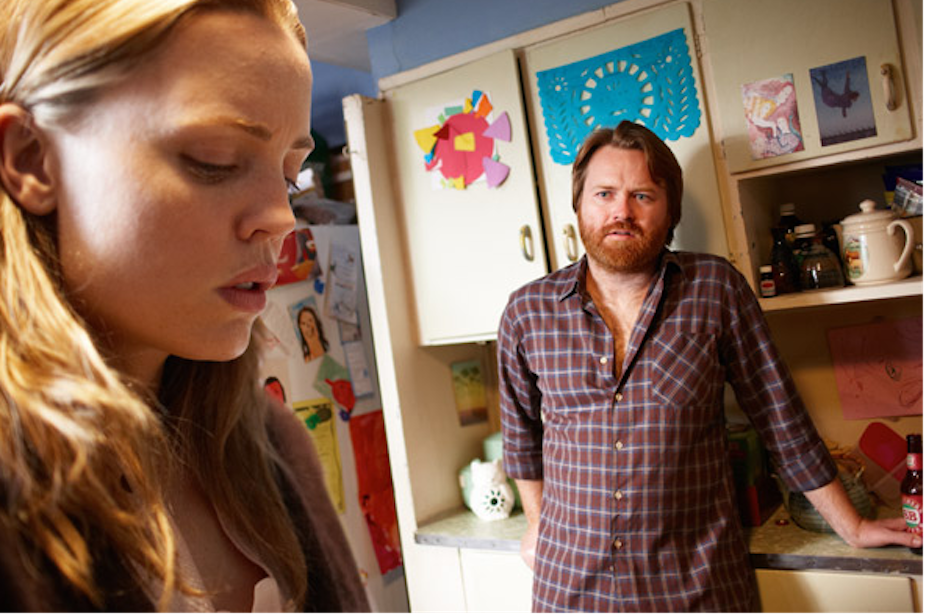Talking to people about The Slap reveals a range of responses, but one opinion is shared: author Christos Tsiolkas has “nailed it” in terms of family tensions. If people have struggled to keep watching until the final episode tonight, it’s because the arguing and the dishonesty are too close to home, rather than being implausible.
Jonathan laPaglia plays Hector, whose fortieth birthday party is the occasion for the slap. LaPaglia calls the story “polarising” but also says that Tsiolkas’s novel draws “complex characters who, although fundamentally good people, end up doing really shitty things to each other. It all gets very messy.” Perhaps he had in mind his own character’s infidelity with a schoolgirl.
It is typical of Tsiolkas that no character is entirely likeable, nor entirely discredited (although several are Collingwood supporters). When Rosie goes to the police because her son Hugo is slapped in the face by Harry, she does not necessarily invite sympathy. But when she asks Harry whether he also hits his wife, viewers are “slapped” with the answer to a question only she has been brave enough to ask: yes he does.

The ABC has promoted The Slap by asking “whose side are you on”, running a poll after each episode. But is the (first) slap itself really so controversial? One character, Aisha, puts things in perspective:
“I think that hitting a child is a reprehensible action. I also think that Hugo needed to be disciplined that day, that he was totally out of control. I think Harry has a dangerous temper which he should learn to control. But he apologised and I think Gary and Rosie should have accepted the apology and left it at that. No one has behaved very well in any of this.”
If the problem raised by the slap is this clear-cut, then perhaps Tsiolkas is interested in something else. The book gives more clues on this point than the television series, even with its ponderous voice-overs.
The novel shows an inflationary spiral of rage and revenge that leads to disproportionate hatred – there is more than a nod to “Greek tragedy” here. This ever-present rage is evident in the contrast between Aisha’s cool summary, above, with this exchange, much more typical of the book:
“F*ck the hearing, f*ck messing about with lawyers. Why don’t I get my cousin Vinnie to deal with the prick? He’ll cut off his balls.” … Antony nodded in grim assent. “That’s right, we should kill the c*nt. Mind my language. But we should kill him.”
The Slap continues the Tsiolkas project of analysing the spiral of Australian society into a state of loathing as well as fear – should we really think of killing people because they have hit a child? Hatred routinely boils over and sticks like toffee.

The situations the Tsiolkas characters find themselves in – craving power, craven in their powerlessness – are mirrored in analyses by writers like Ulrich Beck, who attribute this decline in the power of social relationships, and even simple good will, to changes in the security of employment. It is what Hector, desperate to remain “a family man”, experiences as a “cold, selfish new world”.
In his book Brave New World of Work, Beck argues that “the growing number of men confronted with insecure and fragmented working lives [does not] result in any positive easing of the gender conflict. Indeed … the reign of the short term also undermines relations of partnerships, love, marriage, parenthood and family … – and public life too dies out”
Beck’s argument that men are suffering just as much as women is supported by the episodes “Harry”, “Hector” and “Manolis”, men for whom family seems paramount (even as they betray and are betrayed by their wives). The Slap queries the assumption that “the family” will provide warmth and support; the fact that Hugo continues to be breast-fed as he approaches school age shows that even when given, care can be destructive.
And the catastrophe of Hugo’s upbringing points to a related issue: the vulnerability of children to their parents’ dysfunction, whether that is emotional, economic, or a mixture of both. It is psychological pain that Tsiolkas is interested in, not the physical pain caused by a slap; part of that psychological pain is why people are so constantly enraged as to dream of physical violence, and to see in violence not the beginning of a problem but its resolution.

However cheering it might be to see that see that “support for Harry” plummeted after it was revealed that he had broken his wife’s jaw, if we only ask “whose side are you on” we miss more powerful questions raised by Tsiolkas’s work. These questions are as much about social structures as about individual identities; they are the difficult questions of why people do what they do, rather than the examiner’s question, “who is right?”
The final episode of The Slap airs tonight on ABC1 at 8.30pm

